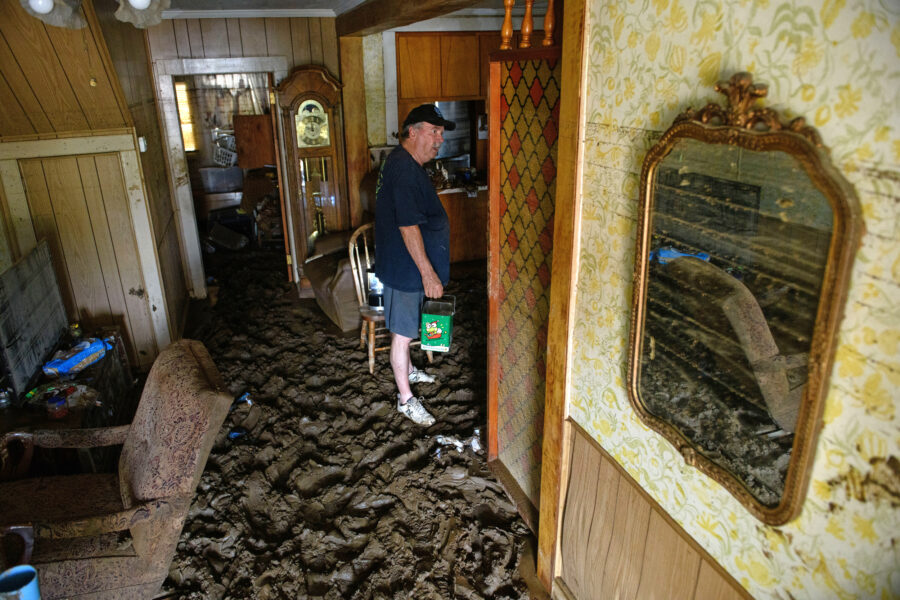After Hurricane Helene, Therapists Dispense ‘Psychological First Aid’
Makayla and Maddux Jamerson slept through a 6:30 a.m. flash flood warning and woke to their three kids screaming that water was coming into the house. In less than an hour there was already more than a foot of water flooding their first-floor duplex apartment in Pisgah Forest, North Carolina.
It was Friday, Sept. 27, and Hurricane Helene was flooding the rustic, rural area popular with outdoorsmen and retirees 30 miles south of Asheville.
“Before we knew it, we were running around passing our kids and animals to each other through a window in thigh-high water,” said Makayla, 28, a waitress.
The Jamersons lived at the bottom of a steeply sloped driveway, and they were able to get their three kids, all under 10, and their dog and two cats safely in the car at the top of the driveway before returning to the house to try to move things to higher ground.
But by 8:30 a.m., they had to admit it was a lost cause as water began coming over the windowsills. They all retreated to their car, where they remained trapped until water finally began to recede around 1 p.m.
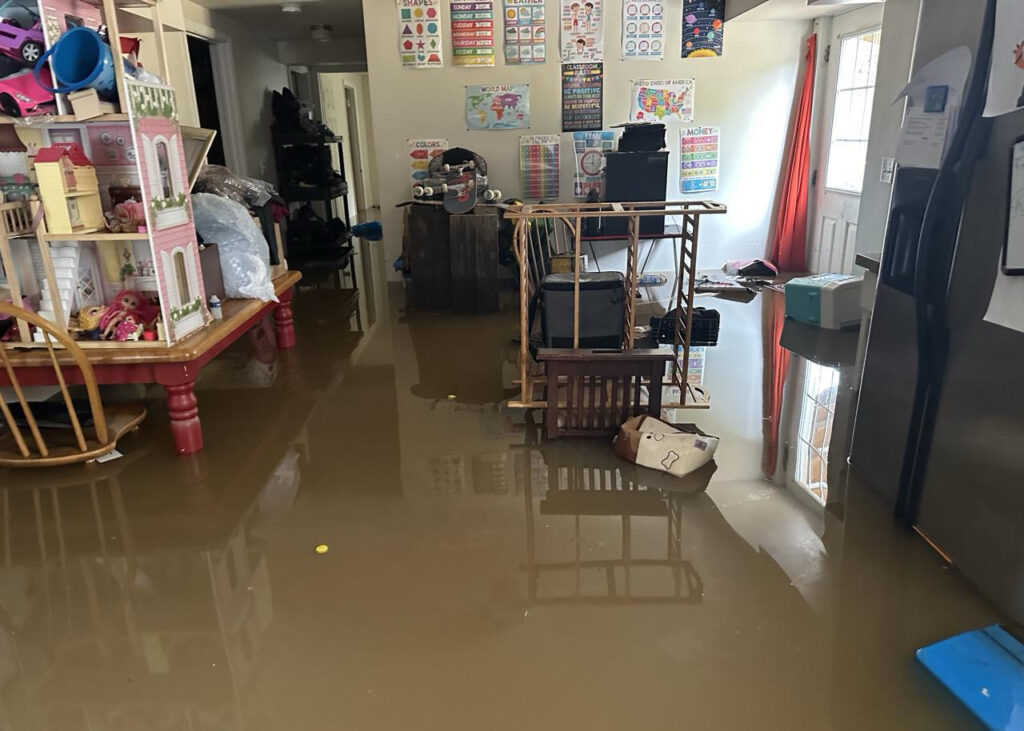
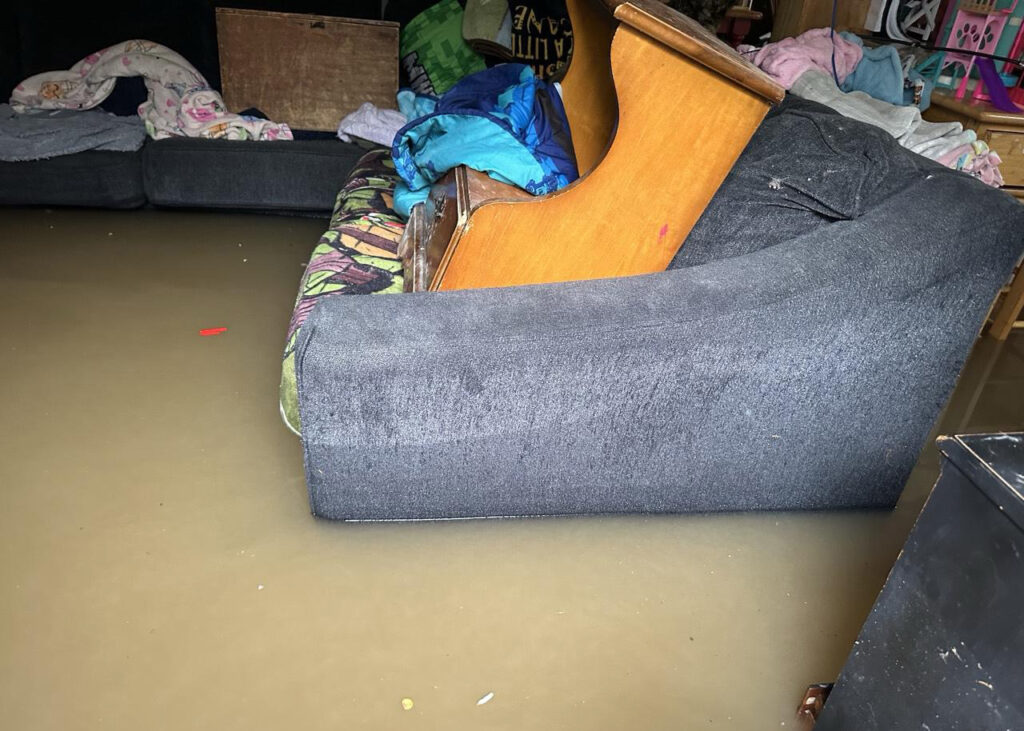
A view of flooding inside Makayla and Maddux Jamerson’s first-floor apartment. They piled their belongings on the sofa in an attempt to save what they could. Credit: Courtesy of Makayla and Maddux Jamerson
The family was able to make it out of the neighborhood and to a relative’s house, where they hunkered down for the first three days without power, internet or cell service. On Sunday, the Jamersons decided to make the trip to Hendersonville to check on elderly relatives, who they have been staying with ever since.
“We’ve just been in survival mode,” said Jamerson.
In the days and weeks following the storm, said Raleigh-based therapist Gina Zotz, that was a good thing. Zotz was among a group of about 250 mental health providers who quickly came together to provide therapy pro bono to those whose homes and lives were devastated by the hurricane.
Zotz said she was working to facilitate both trauma processing and “psychological first aid,” which involved helping meet their basic needs and getting them to a point where they knew that those needs would be met for the long-term.
“Psychological first aid is just so different than what we do in traditional therapy,” said Zotz, who has taken on the role of both therapist and case manager for her pro-bono clients, as she tries to help them process their physical responses to the extreme trauma they just experienced and connect them with essential services and aid.
The hope is that by offering people a chance to process their trauma early and making sure basic needs are met quickly, Zotz said, people can move through this disaster without developing post-traumatic stress disorder on the other side.
“Just because you experienced trauma does not mean you will end up traumatized by it,” she said.
Explore the latest news about what’s at stake for the climate during this election season.
Still, Kelly Caniglia, a trauma therapist who lives in Chapel Hill, about 220 miles east, said she expects it will take months or even years for the full psychological effects of Helene to become clear.
She defined psychological first aid as helping people meet their basic needs for food, water, shelter, medical care and some semblance of security.
Caniglia, who has a virtual practice across the state, immediately began reaching out to her clients in the Asheville area once Helene flooded that part of western North Carolina.
“The idea is to normalize the different things that they’re feeling, to make it OK and to give them anchors,” she said, adding that it was important to “have somebody outside of the devastation that they can connect to, somebody that can help them reality test” and answer questions like, “Is this real? … Did I just survive this?”
Caniglia was also training other therapists in helping people process trauma, with the goal of keeping hurricane victims from developing PTSD, or at least alleviating PTSD symptoms. And Caniglia was working to organize a longer term trauma response.
Caniglia grew up in Florida, where hurricanes and hurricane recovery were part of many people’s lives. She fears that coping with such trauma may be harder in bucolic Asheville, where many moved precisely to avoid the perils of climate change. “Asheville, it’s supposed to be a climate haven,” she said.
“I Finally Cried for the First Time”
By the time Makayla Jamerson got cell service back during the week following the storm, she had already missed a car payment. It had been due on Sunday, Sept. 29, when she was still completely disconnected from the outside world.
Jamerson was told she would have to pay the full amount owed for September and October or face the family’s sole remaining vehicle being repossessed. The bank has since provided clarification that Jamerson will be able to retroactively request a one-month extension, tacking on what would have been her September payment to the end of the loan, and have any late fees waived.
“I finally cried for the first time,” said Jamerson after she got off the phone with the bank.
Jamerson’s health insurance card was destroyed in the flood and she has been left paying out of pocket for medication in the interim. Jamerson has a neurologic sleep disorder and requires medications which cost upward of $1,500 a month without insurance. Once she’s able to reestablish coverage, there’s another aspect of health care she’d love to address: therapy.
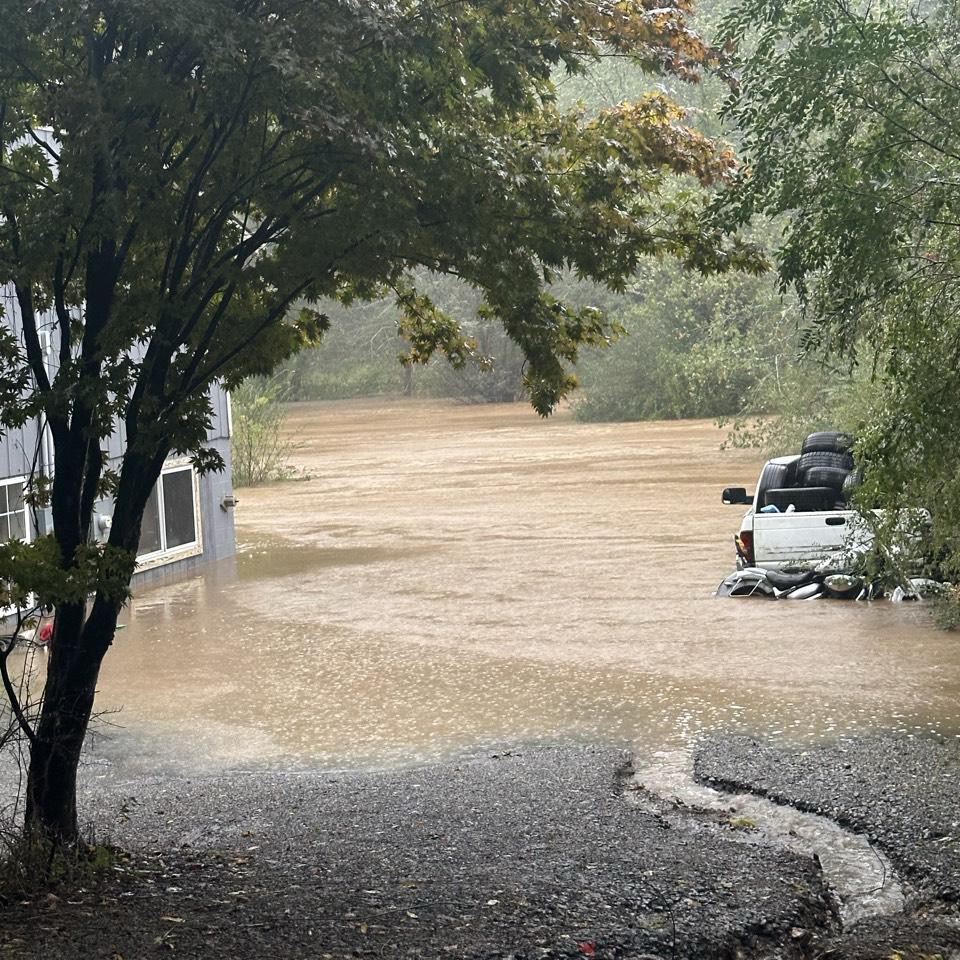
Both Jamerson and her husband work in the service industry, and neither knows when they will be able to bring in a steady income again as both their employers have been hit hard by the storm. In the meantime, left with few options, they have set up a GoFundMe to try to get back on their feet.
“It Was Very Dystopian”
Caniglia, the trauma therapist who relocated from Florida and now lives in Chapel Hill, worries that a larger than average proportion of people impacted by Helene will end up with PTSD.
Part of this is just the nature of being trapped in a life threatening situation. Someone who has never experienced a hurricane before, let alone thought it was even a possibility where they live, is going to have a much larger trauma response, said Caniglia.
“Having an understanding of how these disasters are impacting the body somatically is really important,” she said. “A lot of bodies are going to dissociate, because that’s how the body protects itself when things are just incredibly overwhelming, and that’s OK, we want to normalize it. It’s OK if you’re checked out, it’s OK if you’re outside your body, it’s OK if your body’s having big responses.”
For now, she is working to help clients in the area normalize whatever they are feeling. “First and foremost, we don’t want to pull them out of survival mode, because people in Asheville and the surrounding areas, their bodies are going to continue to be in fight or flight survival mode for a long time,” she said.
“It was very dystopian … It was amazing that people had no idea what they had just survived.”
— Kelly Caniglia, trauma therapist
Caniglia thinks the sudden disconnection they experienced from the digital world when we are so accustomed to instant information compounded an already traumatic situation.
“There’s such another layer now for a generation of young adults that don’t know how to live without [tech], and they were on an island without any of it,” said Caniglia. “They’ve never been without tech. They’ve never been without a phone, without connectivity, and the impact was massive.”
Even having grown up with hurricanes, Caniglia was still shocked by the devastation wrought by Helene. She was in the middle of a session when she received a statewide emergency alert.
When her clients first regained cell service, many had no idea of the scale of the damage. “It was very dystopian … It was amazing that people had no idea what they had just survived,” she said.
One of Caniglia’s clients, an Asheville native, has already brought up moving away to find somewhere safer from climate change. Caniglia is now faced with the daunting task of having to help her clients feel secure again while also facing the reality that there is no such thing as a place completely safe from natural disasters in a climate changed world.
“Everywhere you go, there’s going to be something. And you know, that doesn’t necessarily mean that you’re unsafe, but [it means] understanding that and having the respect for what nature can do… Nowhere is without its risks,” she said.
A Catastrophe in Real Time
Nicole Bellisle has spent the last two weeks grappling with the fallout of what happens when a supposedly “safe” place gets hit with a catastrophe. Before Helene, Bellisle lived on the third floor of the River Mill Apartments, in south Asheville, just across the street from the Swannanoa River, which reached a 26-foot flood level on Sept. 27.
Bellisle had no frame of reference on Friday morning when the river began to flood. “At first, we were very confused. Like we didn’t realize the magnitude of this thing… Then we started to notice that the river was rising,” said Bellisle, 36.
While neither she nor her partner, Tim Becker, 38, are psychologists, both were highly attuned to the psychological effects of trauma. Nicole works with the Conscious Dying Institute, an organization which helps provide training for end-of-life care providers, and Tim is a documentarian focused on harm reduction and drug safety.
With growing shock, they watched as first the dog park, then the roads running parallel on either side of the river, and finally the entire apartment complex were swallowed by water.

“At one point we just decided to break onto the roof to get a better view and just get a lay of the land,” said Bellisle. From there they could see the entire Biltmore Village area was engulfed by the raging river.
On Friday Sept. 27, when the North Fork dam spillways activated, they noticed the velocity of the water increased exponentially, said Bellisle. That’s when they started to worry about the building being carried off its foundations. By this point their building was surrounded by water on all sides, a towering island in the river.
“We watched as propane tanks, cars, parts of buildings not only flowed by … but we watched as these items started to hit the building and take out walls, windows and doors, and so we thought, oh my gosh, do we need to evacuate certain sections of the building in case the building itself starts to collapse?”
Though they were unsure how they would escape, Bellisle and her partner decided to keep go-bags with them just in case the building did collapse and they had to swim for it. The building thankfully held.
As Friday progressed, bewildered refugees from first-floor apartments were taken in by tenants on higher floors. The complex still had water, but had lost power, internet and cell service early in the day. At sunset, the flood water remained high.
Completely cut off from the rest of the world, a group of a little over a dozen tenants, including Bellisle and her partner, who had camp stoves, began organizing dinner for the building.
By 1 a.m. on Saturday, the water had receded enough for looters to descend upon the hollowed-out first floor. Though the residents were able chase them off, it quickly became clear that the building was no longer safe, let alone habitable.
Tim’s parents’ own a house in Asheville that was undamaged by the storm which they offered to their son and Bellisle once they heard their apartment building was uninhabitable.
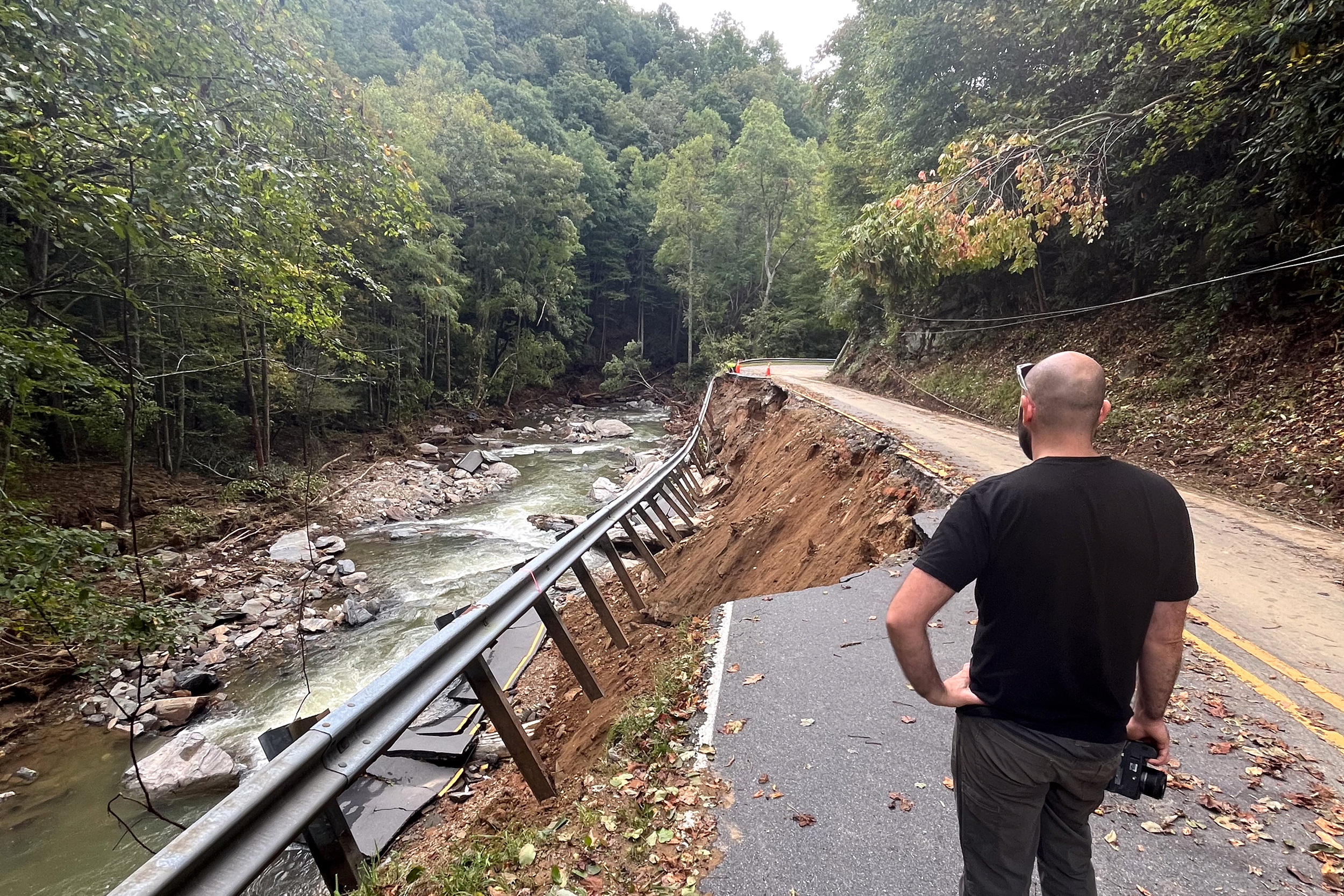
Bellisle recognizes how lucky they are. “I have had a lot of privilege guilt or survivor guilt, around the fact that we’ve actually been OK, and that we’ve landed in a situation where we are safe again,” she said.
One thing that helped the entire complex was that unlike the rest of Asheville, River Mills residents were able to get in touch with the outside within 24 hours of the storm. “My partner actually had a Starlink because he often brings that for his job on the road,” said Bellisle. “We got everyone connected and able to contact loved ones and make plans to get out… That was a really powerful moment.”
Deeply self-reliant, when the couple realized the scale of the damage meant it would take several days for aid to be able to reach them, they decided they could get a jump start on helping.
Citizen Therapists
During an impromptu complex meeting on the destroyed pool deck the next morning, the couple started to organize a team of volunteers to do wellness checks on the surrounding area.
Everywhere they went, people were starved for information. “Not having access to information was part of the devastation. It was part of the trauma. In a lot of ways, not being able to reach loved ones, even in the after, you know, 24 to 36 hours was, in and of itself, causing a lot of people to break down,” said Bellisle.
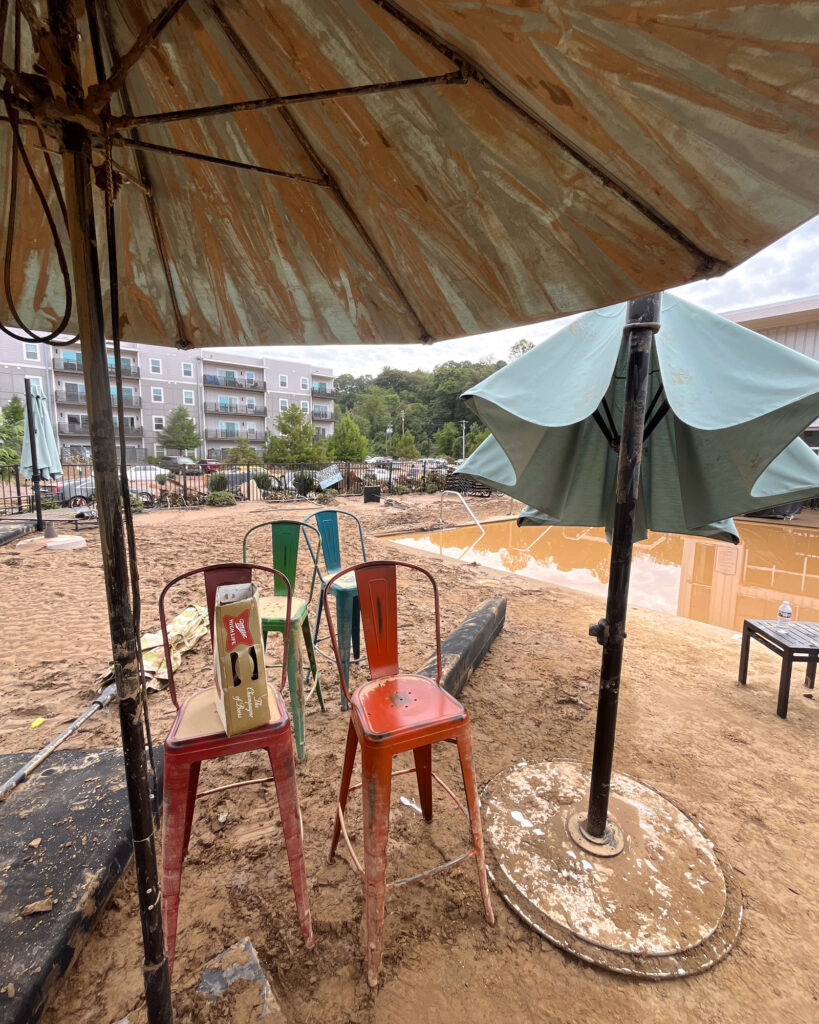
When people would break down, she remembers the impact of simply asking people, “Are you OK? What do you need? Is there anything I can do to help?”
For nearly two weeks, the team from the building, augmented by other friends and neighbors, compartmentalized their emotions so they could keep pushing through the next task. “We just kept going, and even said, like, you know, I don’t actually want to stop to think about what this really means for the months and years ahead, like, I just want to get out there and keep helping,” said Bellisle.
For many of them it became a coping mechanism.
All the volunteers were being continuously exposed to contamination and mold. “We were really in bad shape after that level of exposure,” said Bellisle.
On top of the physical strain the group was also dealing with their own trauma. “A lot of us have insomnia and bad dreams about being out there and getting stuck and finding people,” she said. “We didn’t actually start feeling our feelings until like day 11, and that’s when we started mentally breaking.”
Bellisle has always been in tune with her own emotions and psyche.
“I was like, ‘Oh, something’s off.’ Then I went back to one of the places that we volunteered at, and saw it again after a few days, and was just flooded with memories … I just had to go sit in the grass and break down a bit, and I got really nauseous,” said Bellisle. “I don’t think I’d ever felt this type of grief to the point where I’m physically nauseous.”
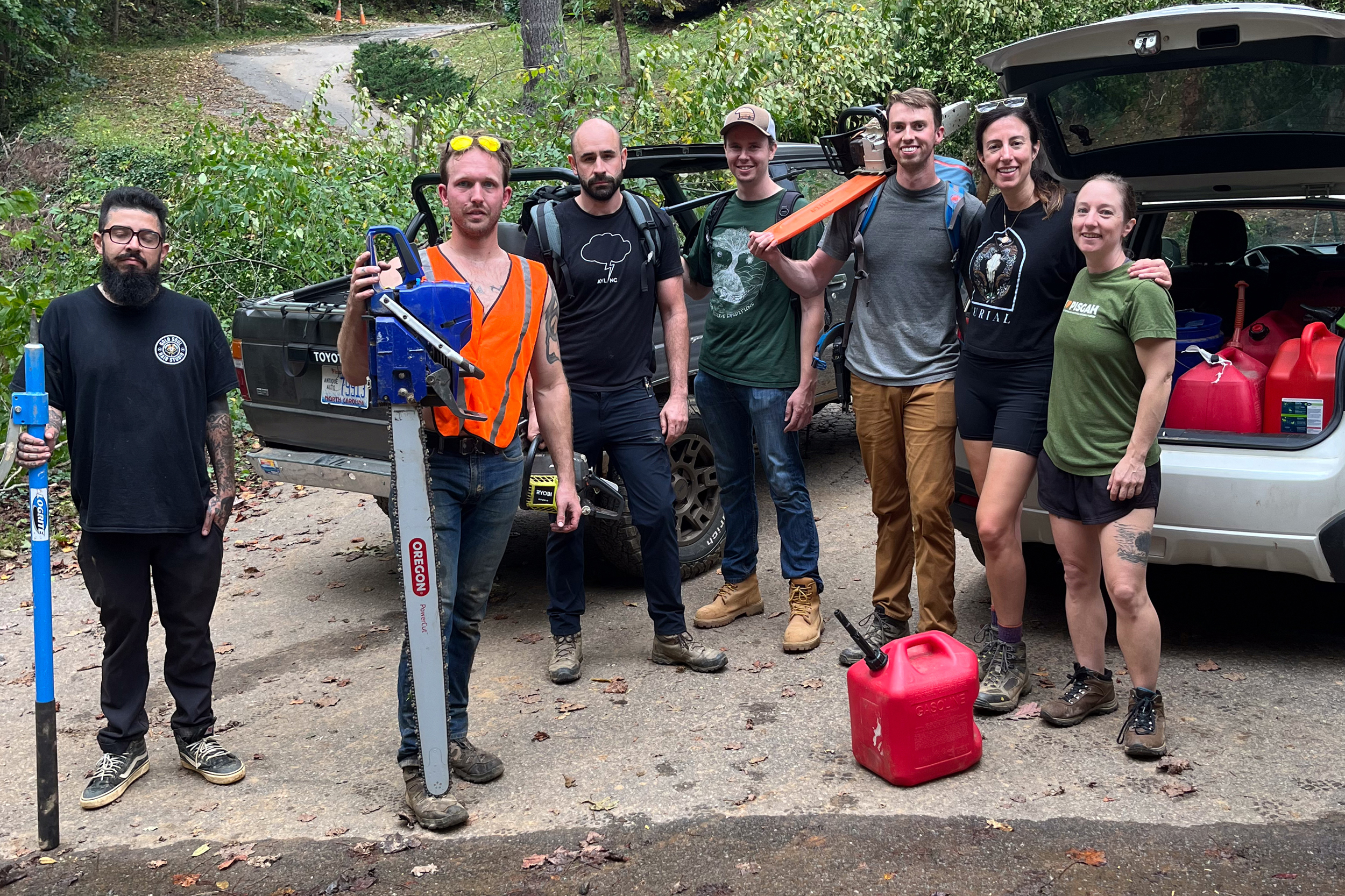
At this point, Bellisle had the self awareness to know she needed to take a step back and care for herself. Bellisle thinks she was able to start processing what had just happened to her community because she was able to leave the immediate trauma at the end of the day and return to her in-laws’ property outside the cone of destruction. There, she had the room to process her grief and trauma in a safe place and begin the process of bringing her nervous system back to baseline.
The opportunity to process in a safe place is a luxury in an area where clean water remains scarce, electricity is spotty and scores of people are now homeless heading into winter.
Staying to Rebuild
Bellisle plans to stay in Asheville, but after the flood, she now believes that nowhere is truly safe from climate change. It’s also too early to tell what Asheville will be after the storm. The city needs a major infrastructure rebuild, and then it will take time to see what it becomes.
Some people have already left. “They have just been so traumatized, they want to get out. Others don’t want to be here for the rebuild. They recognize that it can take nearly a decade for a place to become the cultural hub it once was,” she said.
This has been especially prevalent among the couple’s climate-aware friends, many of whom picked Asheville because of its perceived safety. Some are now leaving.
Bellisle still thinks Asheville is a good bet going forward. “When my partner and I moved here, and as we’ve been imagining starting a family, part of why we chose Asheville was because we thought it was a climate resilient place,” said Bellisle. “We still think this, this is maybe one of the most climate resilient places, and we now know where the floodplain is.”
Bellisle and her partner have a secondary motivation for staying. Both idealistic self-starters, they want to be a part of the rebuild. “We will stay and try to shape what this place becomes, and try to ensure that climate resiliency, cultural preservation and trauma healing is part of the conversation in the rebuilding of Asheville.”
About This Story
Perhaps you noticed: This story, like all the news we publish, is free to read. That’s because Inside Climate News is a 501c3 nonprofit organization. We do not charge a subscription fee, lock our news behind a paywall, or clutter our website with ads. We make our news on climate and the environment freely available to you and anyone who wants it.
That’s not all. We also share our news for free with scores of other media organizations around the country. Many of them can’t afford to do environmental journalism of their own. We’ve built bureaus from coast to coast to report local stories, collaborate with local newsrooms and co-publish articles so that this vital work is shared as widely as possible.
Two of us launched ICN in 2007. Six years later we earned a Pulitzer Prize for National Reporting, and now we run the oldest and largest dedicated climate newsroom in the nation. We tell the story in all its complexity. We hold polluters accountable. We expose environmental injustice. We debunk misinformation. We scrutinize solutions and inspire action.
Donations from readers like you fund every aspect of what we do. If you don’t already, will you support our ongoing work, our reporting on the biggest crisis facing our planet, and help us reach even more readers in more places?
Please take a moment to make a tax-deductible donation. Every one of them makes a difference.
Thank you,
David Sassoon
Founder and Publisher
Vernon Loeb
Executive Editor
Share this article
- Republish
Disclaimer: The copyright of this article belongs to the original author. Reposting this article is solely for the purpose of information dissemination and does not constitute any investment advice. If there is any infringement, please contact us immediately. We will make corrections or deletions as necessary. Thank you.
Title:After Hurricane Helene, Therapists Dispense ‘Psychological First Aid’
Url:https://www.investsfocus.com






